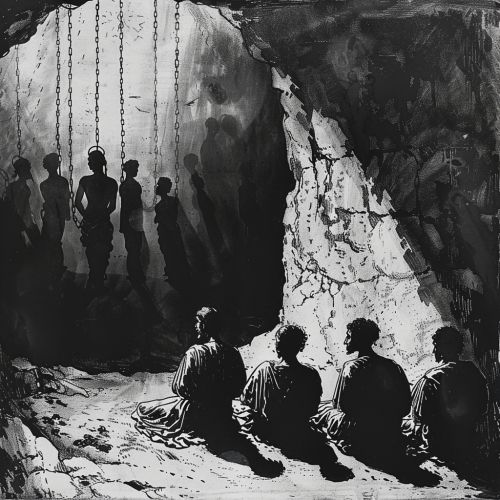Republic (Plato)
Introduction
"Republic" is a Socratic dialogue authored by the ancient Greek philosopher Plato. Written around 380 BCE, it is one of Plato's best-known works and is considered a cornerstone of Western philosophy and political theory. The dialogue explores justice, the just city-state, and the just man, delving into the nature of justice and examining whether the just life is better than the unjust life.
Structure and Method
The "Republic" is structured as a dialogue primarily between Socrates and several other characters, including Glaucon, Adeimantus, Polemarchus, Thrasymachus, and Cleitophon. The dialogue is divided into ten books, each addressing different aspects of the central theme of justice. Plato employs the dialectic method, a form of cooperative argumentative dialogue, to explore philosophical concepts.
Key Themes
Justice
The central theme of the "Republic" is justice. Socrates engages in discussions to define justice and to demonstrate that a just life is more fulfilling than an unjust one. Thrasymachus initially argues that justice is the advantage of the stronger, but Socrates refutes this by demonstrating that justice is a virtue beneficial to both the individual and the society.
The Tripartite Soul
Plato introduces the concept of the tripartite soul, dividing the human psyche into three parts: the rational, the spirited, and the appetitive. The rational part seeks truth and wisdom, the spirited part seeks honor and courage, and the appetitive part seeks physical pleasures and material goods. Justice in the individual is achieved when these three parts are in harmony, with the rational part ruling over the other two.
The Ideal State
Plato's vision of the ideal state is a key aspect of the "Republic." He describes a society divided into three classes: the rulers (philosopher-kings), the auxiliaries (warriors), and the producers (farmers, artisans, and merchants). Each class corresponds to a part of the tripartite soul, with the rulers representing reason, the auxiliaries representing spirit, and the producers representing appetite. Justice in the state is achieved when each class performs its appropriate role without interfering with the others.
The Allegory of the Cave
One of the most famous passages in the "Republic" is the Allegory of the Cave. In this allegory, Plato describes prisoners chained in a cave, only able to see shadows cast on a wall. These shadows represent the prisoners' perception of reality. The allegory illustrates the philosopher's journey from ignorance to enlightenment, emphasizing the importance of education and the philosopher's role in society.


Philosophical Concepts
Theory of Forms
Plato's Theory of Forms is central to his philosophy and is extensively discussed in the "Republic." According to this theory, the material world is a shadow of a higher, immaterial reality composed of perfect, immutable forms or ideas. The forms are the true essence of things, and knowledge of these forms is the highest form of knowledge.
The Philosopher-King
Plato argues that the ideal rulers of the state should be philosopher-kings, individuals who have achieved knowledge of the forms and are thus best equipped to govern justly. The philosopher-king embodies the union of political power and philosophical wisdom, ensuring that the state is governed according to the principles of justice and reason.
The Noble Lie
In the "Republic," Plato introduces the concept of the Noble Lie, a myth or falsehood propagated by the rulers to maintain social harmony and unity. The noble lie asserts that people are born with different types of metal in their souls (gold, silver, or bronze), which determine their class and role in society. This myth is intended to promote social cohesion and acceptance of one's place in the social hierarchy.
Influence and Legacy
The "Republic" has had a profound influence on Western thought, shaping the fields of philosophy, political theory, and education. Its exploration of justice, the ideal state, and the nature of knowledge has inspired countless philosophers, including Aristotle, Augustine of Hippo, and Immanuel Kant. The dialogue's impact extends beyond philosophy, influencing literature, political science, and psychology.
Criticisms
Despite its influence, the "Republic" has faced criticism from various quarters. Some critics argue that Plato's vision of the ideal state is overly authoritarian and undemocratic, with its rigid class structure and emphasis on the rule of philosopher-kings. Others contend that the dialogue's treatment of women and the concept of the noble lie are problematic from an ethical standpoint.
